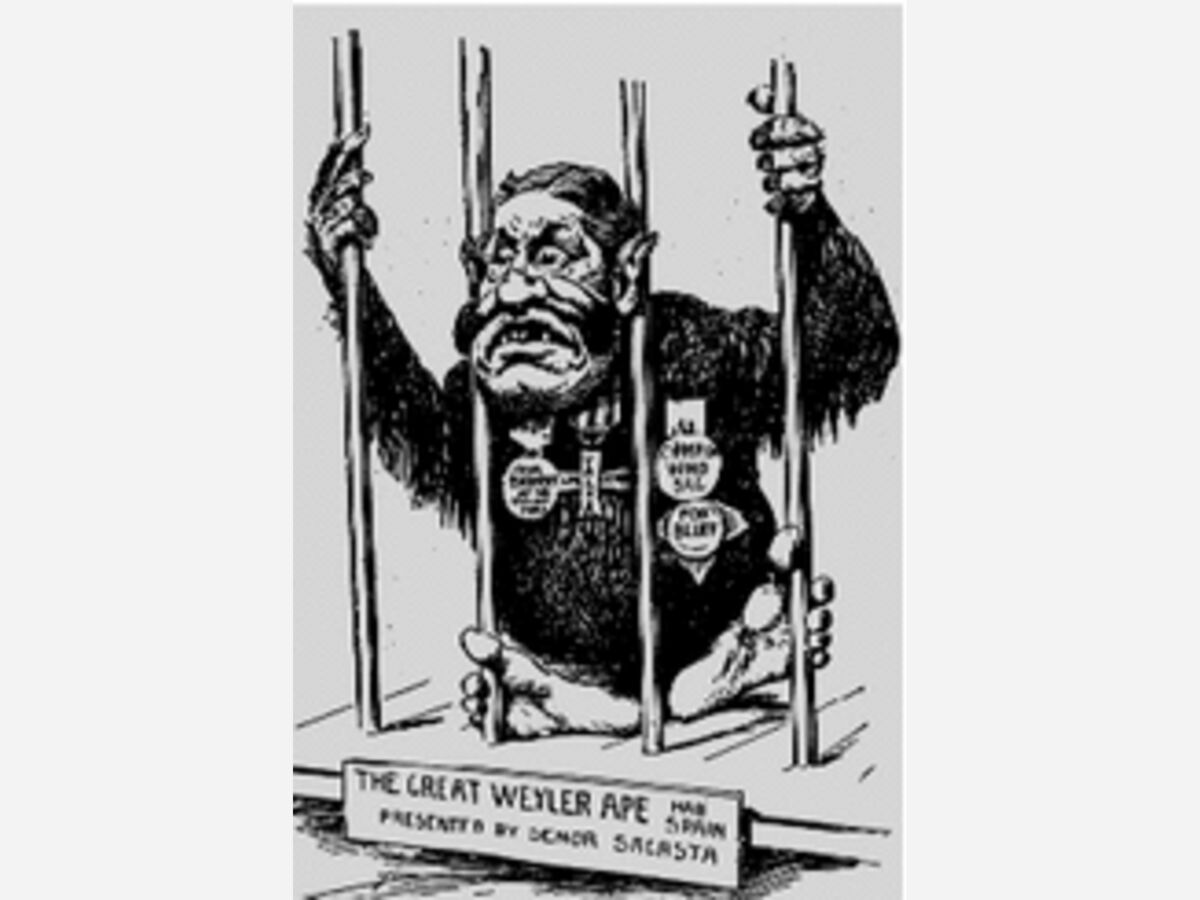Image


Above, most American newspapers painted a highly unsympathetic image of Spanish General Weyler, here portrayed as an animal, for the repressive tactics he embraced to try to maintain Spain’s hold on its empire.
Americans trapped in the midst of war, is a contemporary concern for many. But it is hardly new. One Franklinite and his spouse learned this the hard way during the Cuban War of Independence, that began in 1894 with a ship full of arms traveling from Florida to Cuba and a March 25 Manifesto issued by the mercenaries that launched a renewed war on the Pearl of the Antilles.
Various uprisings and rebellions had been faced down by the Spanish in the previous 20 years but this one seemed to have more staying power, prompting harsh measures from General Weyler, the Spanish commander on the island.
Meanwhile, one Chester M. Whiting, who had built a substantial agricultural business in Cuba with a partner, found himself caught in the middle.
The Sentinel in a preface to an article on Whiting it reproduced from a New York paper, noted many readers would recall Whiting as the son of Milton Whiting and that he grew up on a farm near the Medway Road. He was recalled in youth as “a lad of lively and genial disposition.”
The New York newspaper account.
Chester M. Whiting, an American who owns large sugar and coffee plantations outside of Santiago de Cuba, accompanied by his partner, A.W. Taylor, was a passenger on the steamer Niagara, which arrived here this morning. Mr. Whiting and his partner were driven out of Cuba, not by order of General Weyler, but because they could no longer operate their plantation. General Weyler made no actual order for their expulsion, but Mr. Whiting as led to believe that it would be wise for him to return to America.
Just why he does not know. He said this morning that he had remained entirely neutral during all hostilities, though his plantation lay in the district into which both Spanish and Cuban forces made sorties.
A “battle” was fought on Mr. Whiting’s sugar plantation on April 19, last. The Cubans had camped for the night on Mr. Whiting’s place, and in the morning they were attacked by the Spaniards. The Cubans retreated, leaving the Spanish troops in possession. The commander at once ordered Mr. Whiting under arrest, but on discovering that he was an American citizen, he rescinded the order. All of the plantation hands, however, were placed under arrest. Shortly afterwards, five of the men were led out and shot. There was no trial or even a pretense of one. The men were simply butchered. A few days later, the other men were set at liberty upon the protest of Mr. Whiting. To a reporter for the Mail and Express Mr. Whiting said this morning, when seen on leaving the Niagara: -
-“There is very little that I can tell you at present. You see I must consult my lawyer as to what is advisable. I am practically ruined, as it was not possible to grind sugar or to work the coffee plantation. I have, of course, heavy claims against the Spanish government, and they will be pressed at once. I am going to Philadelphia, my home, today.”
“As far as your observations, just what is the situation in Cuba today?” [Asked the reporter]
“Well,” replied Mr. Whiting, “General Weyler has threatened to do a lot. He has accomplished so far absolutely nothing. the Cuban forces are well organized and well drilled. They are in better shape today than they have ever been.
“The idea that the insurgents are simply bands of marauding forces is perfectly absurd. The insurgent army is better drilled and better handled than the Spanish forces. The Cubans wage war like civilized human beings. I am in a position to speak authoritatively on this subject for my place lay between the two lines.”
“That is, of course, an impossible question to answer, but it is safe to say that they can never be beaten. General Weyler has done much to help them. He is one of the best recruiting officers the Cubans could have. His recent order for the reconcentration of the country people in the cities has swelled the Cuban forces greatly. Men are simply crowding into the Cuban army.
“Take the case of my own men as an example. I had 170 men on my place. When Weyler’s order was received and the men were told of it, they laughed. The next morning, 160 of them left in a body and walked into the Cuban lines. They are all fighting for Cuba libra today. That is one tale told over the island. There are thousands of cases like it.
“I am sorry that I must speak so vaguely of Cuban affairs, but for the present I must do so. I hope next week to be able to tell much more and to give instances of the great brutality of the Spanish forces.”
The details of the succeeding years are not known but apparently he did “press his claims” – but war between the US and Cuba broke out in 1898, leading to a US victory and the nominal independence of Cuba under the watchful eyes of Uncle Sam. And that doubtless turned to delay.
According to an Oct. 1909 report of the Attorney General, Assistant, for Spanish Treaty Claims Commission, Whiting and his wife, Anna L., and his partner had severally claimed compensation of about a quarter million dollars for the “destruction and loss of sugar cane and sugar, corn, buildings, distillery machinery, implements and live stock, also loss of use and occupation, plantation “El Triunfo,” 1895, 1896, and 1897, by insurgent and Spanish forces.
Their final compensation, according to the report, totaled only around $10,000.
Whiting died in 1919, at about 80 years of age, and is buried in the Union Street Cemetery.